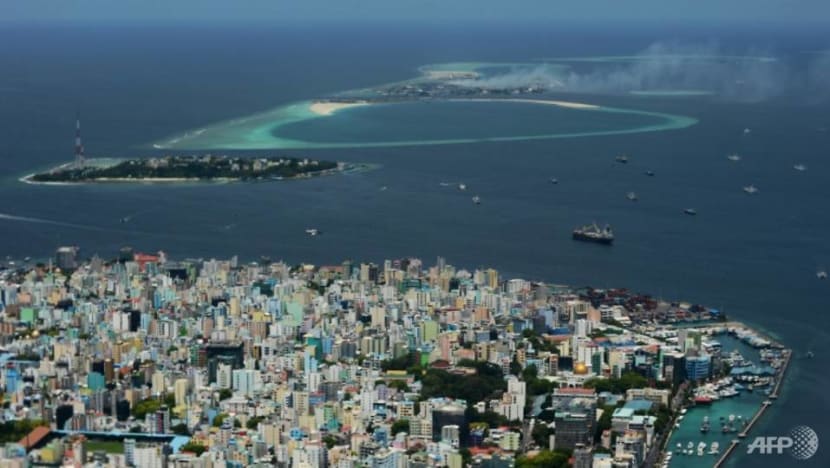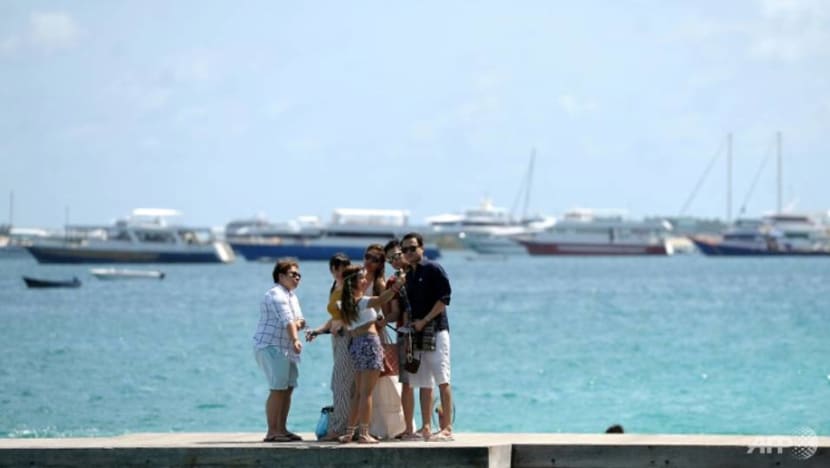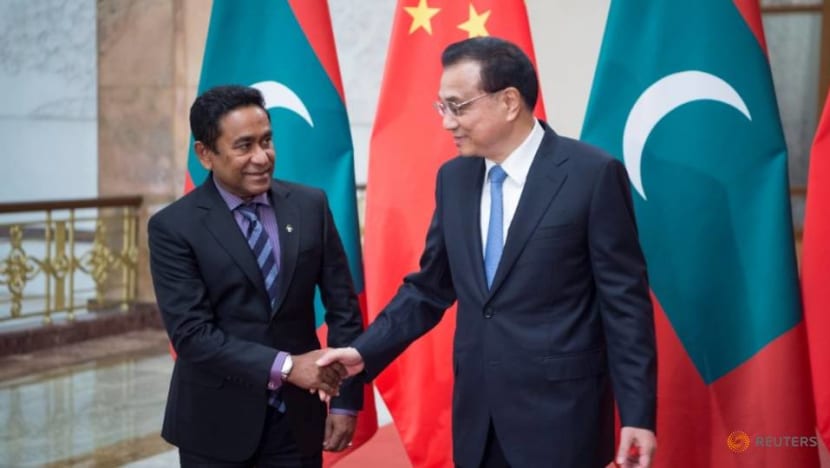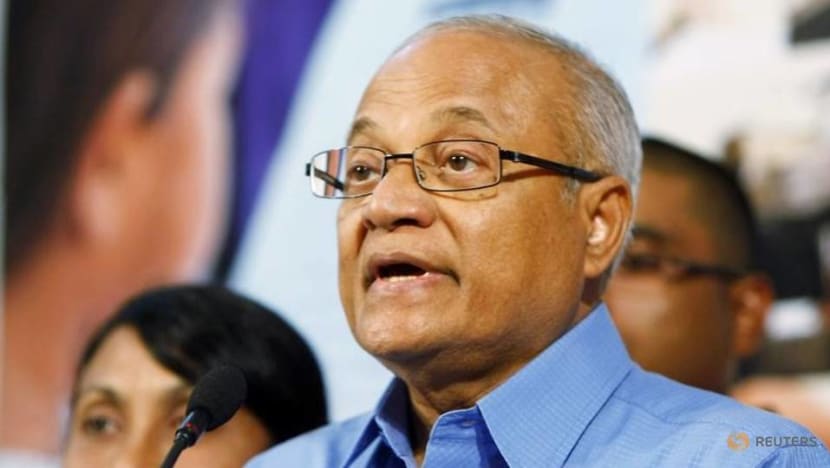commentary Commentary
Commentary: Maldives, a brewing crisis in paradise
With the looming elections and controversial developments in recent years, global attention should be cast on the Maldives, says one observer from the Brookings Institution.

The ongoing unrest has dented the Maldives' image as a popular holiday destination (Photo: AFP/ROBERTO SCHMIDT)
MALE: A crisis is brewing in an Indian Ocean paradise.
Elections next month in the Maldives will probably cement the power of the nation’s leader and consolidate the control of China and Saudi Arabia over this strategic island chain. India is already deeply concerned about the implications of this power struggle.
The Maldives are the central part of a chain of islands that begins on the west coast of India with the Lakshadweep Islands and ends deep in the Indian Ocean at the Chagos Archipelago, including the major American military base at Diego Garcia.
The Republic of the Maldives comprises almost 1,200 islands. It’s the lowest country in the world, with an average height of less than five feet above sea level.
Some islands have become home to high-end expensive hotels, and over one hundred islands are resorts. Of its roughly 418,000 people, a majority are Muslims.
The capital of Male is among the most densely populated cities in the world, officially with about 140,000 people in about two square miles. The population is probably much higher than the official figure.
Approached from the sea, Male appears to be a city floating on the ocean. The national airport is on an adjacent island. The country was a British colony until 1965, and before the British takeover in the 1880s, it was a Sultanate with strong ties to Arabia and India.

LEADERS UNPOPULAR, CRITICISED BY OPPOSITION
Maumoon Abdul Gayoom ruled the islands for 30 years of the country’s independence, from 1978 to 2008. He grew up in Egypt and studied at Al Azhar University, then a stronghold of Islamic radical ideas.
He survived three coup attempts, with Indian army paratroopers rescuing him the final time in 1988. His reign was marked by corruption and intimidation, and no challenger was allowed in rigged elections. He lost the election in 2008 to a political reformer only after considerable international pressure.
His successor, Mohammad Nasheed, tried to open the political process and rally world attention to global warming. He held a cabinet meeting underwater to dramatise the threat posed by the rising sea level to the Maldives. But he faced constant opposition and conspiracies from Gayoom loyalists.
He was deposed in 2012, convicted on trumped-up charges the next year and is now in exile in London.
Abdallah Yameen took power in 2013 and brought in China, which had not even had an embassy before 2012. Gayoom’s half-brother, Yameen has greatly expanded the airport with Chinese aid money and is constructing a bridge to connect it to Male, also with China’s aid money.

More tourists are arriving than ever, many from China. The country is now heavily in debt to China, with which Yameen also signed a controversial free trade agreement.
Many of Yameen’s opponents fear the country is in a Chinese-designed debt trap that Beijing will use to extract political and military concessions from Male. In the worst case, Yameen might give the Chinese a military base.
NEIGHBOURS ARE BOTH SUPPORTERS AND CRITICS
Saudi Arabia has also invested heavily in the Maldives. The young Crown Prince Mohammed bin Salman is a frequent visitor.
The Saudis have bought entire islands for private use. This too has been widely criticised by the opposition. The Saudis are building a new national mosque, which will be the nation’s largest, in Male - named after King Salman. The Saudis and Chinese are cooperating on several projects.
The Maldives has, in return, supported the Saudis on the diplomatic front. It supports the war in Yemen, backed Saudi Arabia’s boycott of Qatar last year, and have supported Riyadh in its current quarrel with Canada.
The Saudis, for their part, supported Yameen’s decision in February to impose a state of emergency and arrest several top judges who ruled that Yameen must open the election process up.
Yameen also sent his half-brother and former President Gayoom to jail. The state of emergency was lifted after 45 days, but the country is not calm.

India is the strongest critic of Yameen’s moves toward authoritarianism. It has criticised the pressures put on the supreme court and parliament under the state of emergency and said elections should proceed in a free and fair manner. The Indians expect that a rigged vote this September will consolidate power for Yameen.
A senior Indian diplomat told me last week that New Delhi fears that the Maldives will turn into a hostile port inclined toward China and thwart the crucial shipping lanes of the Indian Ocean. Combined with China’s powerful position in Pakistan and gains in Sri Lanka, India feels surrounded.
The announcement last weekend that the Maldives wants the small Indian helicopter rescue mission in the islands to go home will only add to the jitters in Delhi.
GLOBAL INTERESTS ARE AT STAKE
The Trump administration is unlikely to care much about the demise of democracy in a far-away archipelago.
President Trump made it abundantly clear when he visited Riyadh in 2017, his first foreign port of call as president, that human rights and democracy are not on his agenda. So India is probably going to be on its own.
Global interests are at stake for another reason. Per capita, the Maldives produces more jihadis than any other country, according to Norwegian researchers.
Over 200 have gone to fight in Syria for al-Qaida or the Islamic State. In Male, they are regarded as heroes.
The decades of dictatorship and Saudi proselytisation have encouraged the radicalisation of Islam in paradise. The islands’ strategic location, the complex regional power play for influence in Male, and the jihadis’ breeding rate should get attention even in the Trump era.
Washington should consult closely with New Delhi and others to promote free elections and an open political process. The Maldives can be a concrete issue for the US-India dialogue.
Bruce Riedel is a senior fellow and director of the Brookings Intelligence Project, a part of the Brookings Center for 21st Century Security and Intelligence. He also serves as a senior fellow in the Center for Middle East Policy. A version of commentary first appeared in the Brookings Institution’s blog Order from Chaos.














